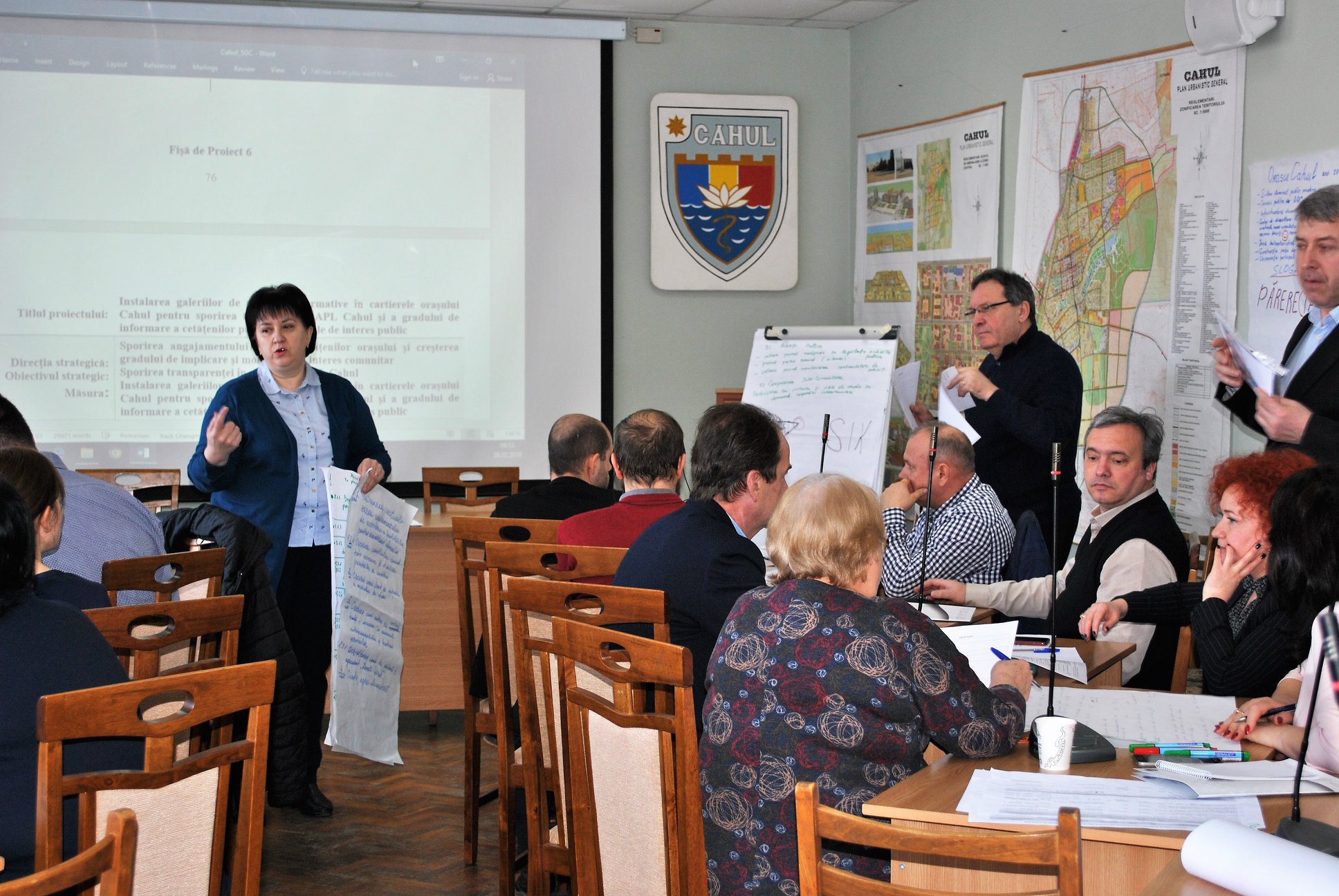Increasing budget transparency at the local government level in Moldova

To increase budget transparency at the local level in Moldova and improve citizen engagement, the Comunitatea Mea program is working with local public officials to help them prepare for the annual budget planning and review process. This includes opening up budget hearings to the public—a first for approximately half of the participating Local Public Administrations (LPAs)—and institutionalizing regular financial reporting.
To date, the program has assisted 20 LPAs. Of these, 17 communities have organized public budget hearings and attracted over 500 residents to participate.
Lack of budget transparency at the local level in Moldova
For most Moldovans, until recently, how their community’s budget was developed and executed remained a complete mystery.
Even those residents who understood the process had no say in the development of their LPA’s budget, lacking venues to express their concerns or champion budgetary issues that mattered most to them. Parents of kindergarten children did not know how much their primaria, or local government, spent on meals for their children, and farmers were not aware of how much their community spent on road repairs or local market maintenance.
After decades of inadequate public engagement in budgeting, Moldovans came to expect a lack of transparency and accessibility on issues of public financial management. Even in communities where the local government prioritized citizens’ needs, many residents were not properly informed or involved in the process of drafting or reviewing budgets.
Uniting communities through public budget hearings
To address the divide between local governments and their constituents in Moldova, the Comunitatea Mea program has trained communities on citizen engagement in the primaria budgeting process. Following training workshops, Comunitatea Mea specialists have worked directly with town hall staff to design, promote, and facilitate public budget hearings in their communities.
Over the course of two months leading up to finalization of budgets, Comunitatea Mea specialists provided “training of trainers” workshops for mayors and other LPA staff. The team helped them analyze their spending, prepare simple yet informative presentations, and apply best practices in community engagement, including through new channels of communication, such as social media.
The public budget hearings attracted over 500 residents across the 17 communities. The program’s assistance contributed to streamlining procedures and aligning local budgets with communities’ priorities, legislation, and regulations.
Each public hearing was conducted by town hall representatives such as the secretary of the local council, chief accountant, or local council members. They first presented the goals of the event, the agenda, and the rules before opening it up to the mayor, who shared information regarding proposed local taxes for the next year and the budget. After the mayor’s presentation, citizens had the opportunity to offer feedback and proposals.
Mayors and government staff valued the public hearings as opportunities to inform citizens about available local resources, engage them in discussions about the local budget, and ensure transparency of public expenditures. Serghei Anastasov, the mayor of Comrat, said, “Through this event, I had the chance to explain to the citizens the taxes they pay, what proportion they represent in the whole budget of the town, and how these taxes contribute to solving local problems.”
Moldovans are playing a more active role in their communities
Attendees said they appreciated that their elected officials and government staff were presenting this information in relatable language, stripped of the technical jargon that government employees and financial experts often use.
In addition, these public budget hearings gave residents of Moldovan communities an opportunity to witness and participate in budget preparations. Those who chose to attend these sessions gained a better understand of their LPA’s revenues and expenditures. More importantly, these citizens played a part in the development of their community and engaged with their elected representatives.
Citizens identified and prioritized issues that were not being addressed by their local governments. For example, in Straseni, after the primaria delivered a presentation on local expenditures, families with young children learned that the city’s officials are not responsible for, and have no funds for, the local kindergarten’s cafeteria. After learning that the central government had not provided adequate funds for quality meals, local parents organized a community action committee to raise funds and improve the quality of meals offered in their kindergarten.
The purpose of engaging constituents in the budgeting process is to create a path for improved communication, not only by providing constituents with information about how budgetary processes work, but by inviting them to take an active role in determining the financial direction and priorities of their communities. Empowering citizens to play a more active role in their communities is an extensive process, but communities are learning a valuable first step in doing so.
Comunitatea Mea is a five-year program funded by the United States Agency for International Development (USAID) and implemented by IREX, in partnership with TetraTech and Urban Institute. The program’s purpose is to improve the capacity of local public authorities (LPAs), including their ability to work inclusively with citizens and civil society, to increase revenues, improve financial management practices, build stronger checks and balances between the central and local governments, and facilitate public-private partnerships and intermunicipal cooperation.
Disclaimer: This post is made possible by the generous support of the American people through the United States Agency for International Development (USAID). The contents of this post are the sole responsibility of IREX and do not necessarily reflect the views of USAID or the United States Government.